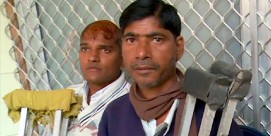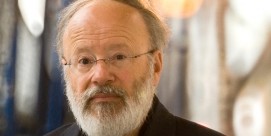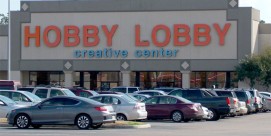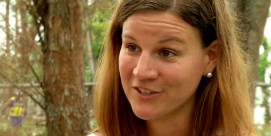Parish Nurses
BOB ABERNETHY: And now the ministry of parish nurses or congregation nurses. They’re sent out by their faith communities to provide health services to fellow parishioners. Working 20 to 25 hours a week, they provide care at no charge. The nurses themselves are paid either by their congregations or, in poorer communities, by hospitals or foundations. The idea has caught on. There are now 10,000 to 15,000 parish nurses in this country. From Chicago, Judy Valente reports.
Ms. YORUBA SIDDIQ (United Church of Christ): I pray all day every day. I pray as I walk. I pray as I talk. Prayer is a living thing for me.
Ms. LORETTA CALDWELL: Come right on in.
JUDY VALENTE: Yoruba Siddiq often visits the ill and the elderly members of her congregation on Chicago’s South Side. She spends time with them in prayer.
Ms. SIDDIQ: Most gracious and eternal God, I thank you for this day.
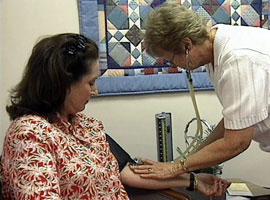 VALENTE: But these visits aren’t merely social or even pastoral. Yoruba Siddiq is here primarily as a registered nurse, sent by her church to check on the physical, as well as the spiritual well-being of her fellow parishioners. With hospital visits getting shorter and medical bureaucracy more complex, churches, mosques, and synagogues are becoming an important health resource. More and more religious groups are trying to get their members to look at health as a gift from God. The parish nurse helps by serving as health counselor, liaison to the medical community, and role model for showing the connection between faith and health.
VALENTE: But these visits aren’t merely social or even pastoral. Yoruba Siddiq is here primarily as a registered nurse, sent by her church to check on the physical, as well as the spiritual well-being of her fellow parishioners. With hospital visits getting shorter and medical bureaucracy more complex, churches, mosques, and synagogues are becoming an important health resource. More and more religious groups are trying to get their members to look at health as a gift from God. The parish nurse helps by serving as health counselor, liaison to the medical community, and role model for showing the connection between faith and health.
Reverend DELOIS BROWN-DANIELS (Advocate Health Care): As time went on, we kind of gave our bodies to the medical community, we gave the minds to the psychiatrist, and we kept the spirit in the church. When you come to worship on Sunday morning, you don’t leave your body outside the doors.
VALENTE: Congregation nurses are almost always RNs, but to avoid liability issues, they aren’t expected to perform complex medical procedures. They focus on simple forms of screening, wellness education, and helping people find proper medical care.
Ms. ANN SOLARI-TWADELL (International Parish Nurse Resources Center): They’re not going to be monitoring medications, monitoring IVs, that sort of thing. That is the role of the home care nurse or the community health nurse. The real key is that they’re meeting people earlier in their disease process, just someone listening to them and helping them figure out what is going on in their life.
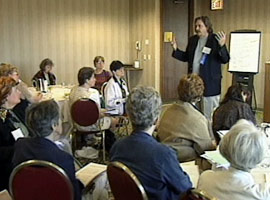 VALENTE: Starting with just six Chicago area nurses in 1985, parish nursing has now spread to nearly every state and four foreign countries. Three thousand congregation nurses were trained in just the past three years, not just at churches but at a mosque and synagogues. A thousand parish nurses gathered in suburban Chicago recently for a series of workshops covering subjects like health and prayer, men’s health, and the healing power of music.
VALENTE: Starting with just six Chicago area nurses in 1985, parish nursing has now spread to nearly every state and four foreign countries. Three thousand congregation nurses were trained in just the past three years, not just at churches but at a mosque and synagogues. A thousand parish nurses gathered in suburban Chicago recently for a series of workshops covering subjects like health and prayer, men’s health, and the healing power of music.
VALENTE: This nurse plans to introduce parish nursing in Swaziland, an African nation where nearly 25 percent of the population is HIV positive.
Ms. THANDIWE DLAMINI (Swaziland): My church has got 25 parishes and about 10 other outstations, so it really increased the coverage of the government and non-government organizations who work in HIV and AIDS.
VALENTE: In the U.S., parish nurses play a vital role in impoverished communities.
Reverend LEROY SANDERS (United Church of Christ): Those who come, who have no insurance, who have no job, who are homeless and jobless, then she’s able to minister to them.
VALENTE: What types of problems do people come to you with?
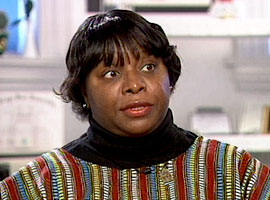 Ms. SIDDIQ: Just about every medical problem that you probably could think of, with the basic medical problems in the black community being hypertension, diabetes.
Ms. SIDDIQ: Just about every medical problem that you probably could think of, with the basic medical problems in the black community being hypertension, diabetes.
VALENTE: Loretta Caldwell is still recovering from the spinal surgery she had two years ago. Her parish nurse visited her daily at the hospital.
Ms. CALDWELL: She always had words of comfort for me, we always had prayer, you know. Anything that she thought I needed, she would see that I got it and so forth, you know, and she took time with me, which I needed, time.
Ms. SIDDIQ: I get to combine my spiritual life, my spiritual being, with my nursing career. You can pray with the patient. We can address the patient’s spiritual concerns, concerns about God, that usually when you are in a hospital setting, you’re not really free to do as much.
(On telephone) Hello, Vel, how are you doing? This is Yoruba, your parish nurse. I just called to see how you were feeling.
VALENTE: Yoruba Siddiq is paid through a grant from Advocate Health Care, a non-profit hospital group. Increasing numbers of hospitals are funding parish nurses in poor areas.
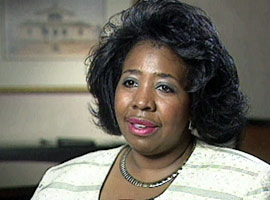 Rev. BROWN-DANIELS: Absolutely, it’s a good investment. It is in the best interest of any hospital to partner with the faith communities in order to provide the ongoing support that the people will need once they leave the hospital.
Rev. BROWN-DANIELS: Absolutely, it’s a good investment. It is in the best interest of any hospital to partner with the faith communities in order to provide the ongoing support that the people will need once they leave the hospital.
VALENTE: Forty miles but a world away from Yoruba Siddiq’s neighborhood, Saralea Holstrom is on staff at Our Savior’s Lutheran Church in Naperville, Illinois. The role of the parish nurse in this affluent community is no less important.
Ms. SARALEA HOLSTROM (Our Savior’s Lutheran Church): I just try to be available, easily accessible. For someone to talk to me, they don’t have to press one for this and press two for that. I am a human being who answers the phone.
You’re looking good.
Ms. LOIS CLARK: Well, I’m feeling pretty good.
Ms. HOLSTROM: Good. Good. And your dialysis is going all right?
Ms. CLARK: Well, it’s going real good, yeah.
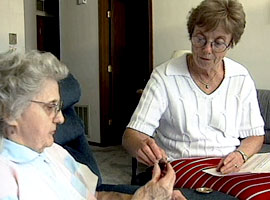 Ms. HOLSTROM: This lady is on dialysis. She has a port in her arm. There’s been a couple times where there was a question about is this perhaps infected?
Ms. HOLSTROM: This lady is on dialysis. She has a port in her arm. There’s been a couple times where there was a question about is this perhaps infected?
Well, I brought communion. Peace to you from our Lord Jesus Christ. The body of Christ given for you, Lois.
VALENTE: It is the type of holistic care Lois Clark can’t get from the nurses she sees at her dialysis sessions three times a week.
Ms. CLARK: They’re just — they’ll take your blood pressure and they take care of that, which theirs reaches more into your personal and to your soul and the spiritual end of it, you know, along with the — it helps you cope with your medical problems, you know, just to have that faith and that connection there.
VALENTE: At the very heart of parish nursing is a strong belief in the relationship between soul, mind and body, faith and healing.
Ms. SIDDIQ: One of the main spiritual concerns is why is this happening to me? Why is God letting this happen to me? And even though we don’t know the answer, we always let them know that God is with them, even through this sickness and healing.
Ms. HOLSTROM: Now and forever, amen.
Ms. SIDDIQ: I ask this, in the name of Jesus, amen.
Ms. CALDWELL: Amen.
VALENTE: For Religion & Ethics NewsWeekly, this is Judy Valente in Chicago.

